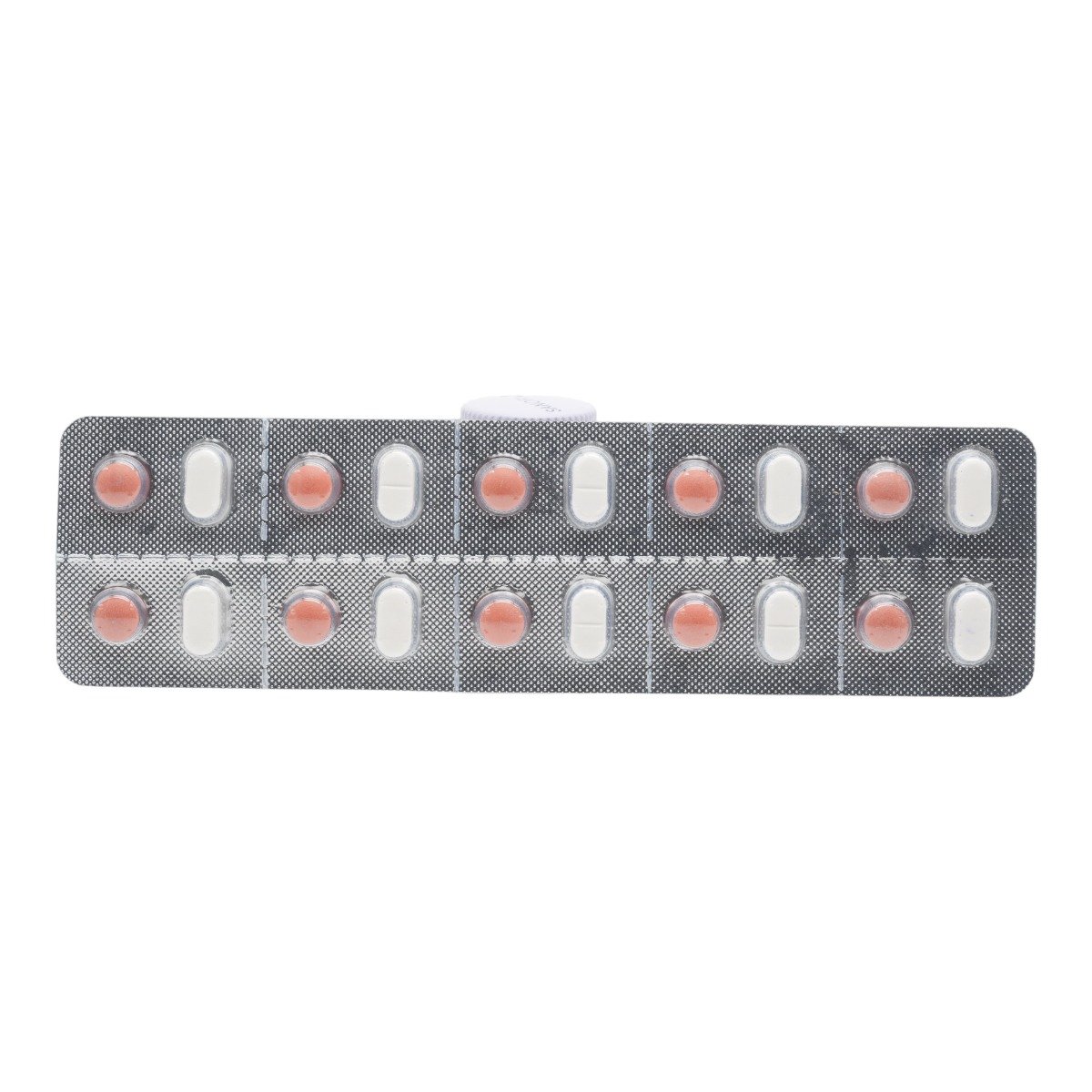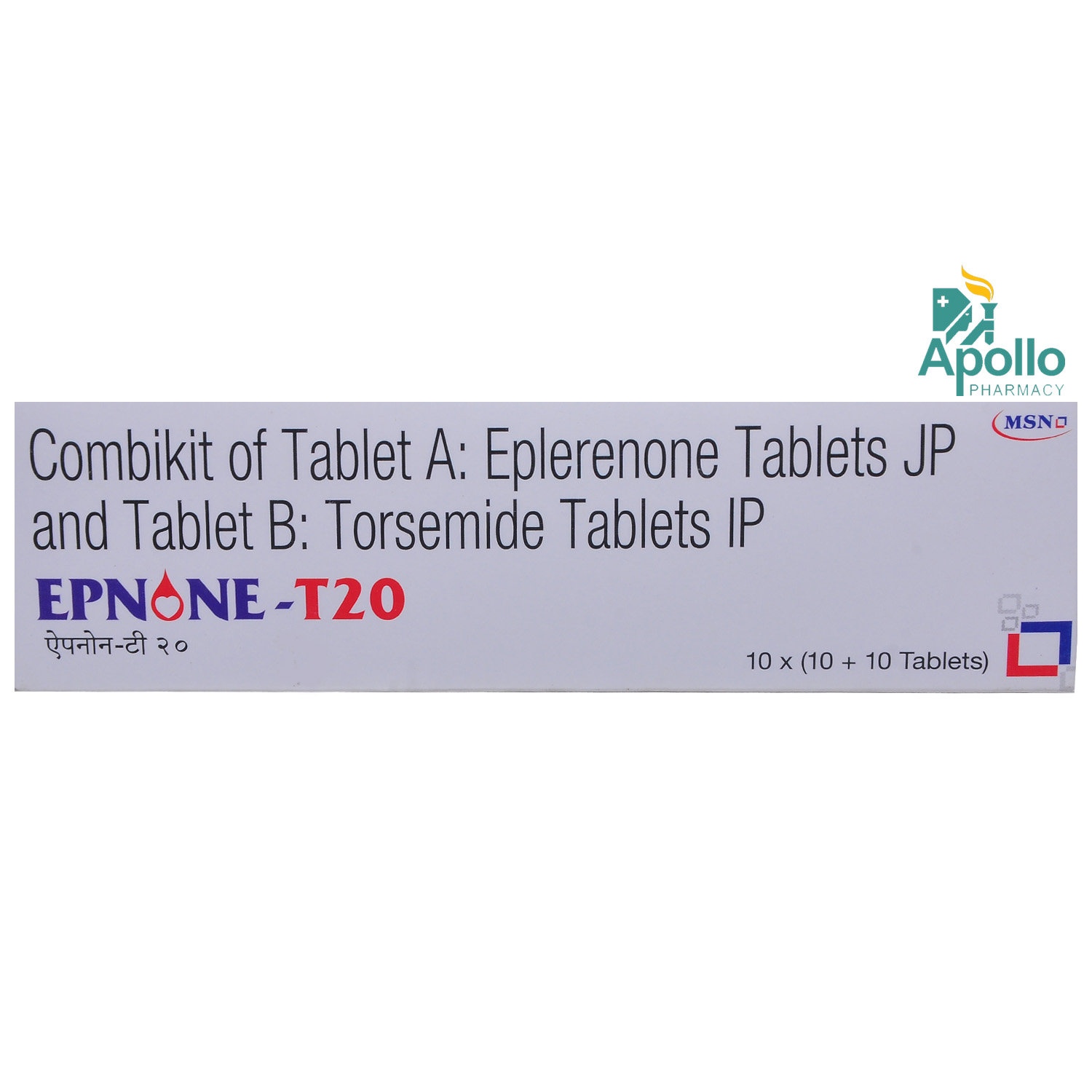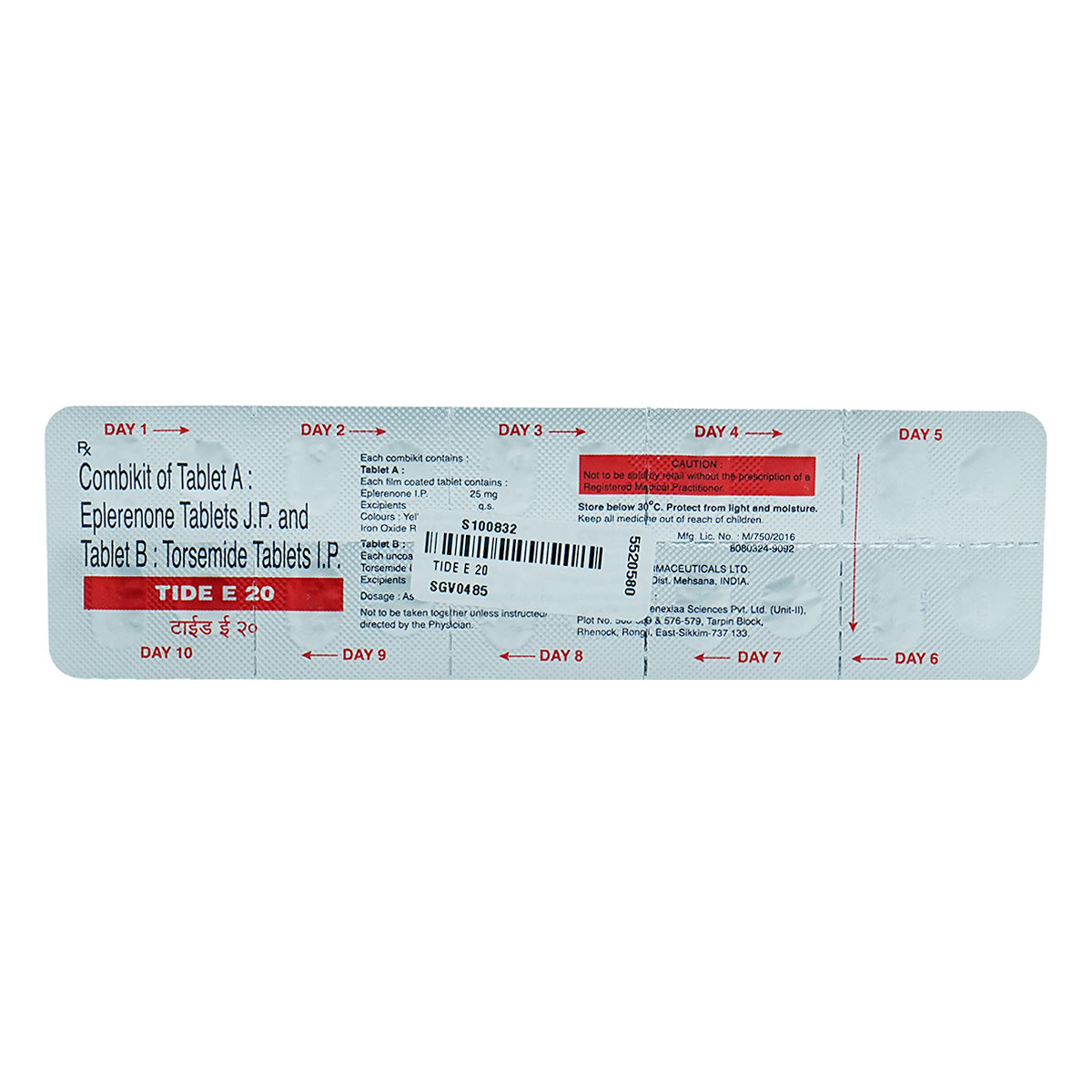Dytor E 20 Combikit
MRP ₹330.5
(Inclusive of all Taxes)
₹49.6 Cashback (15%)
Know Your Delivery Time
Provide Delivery Location

Secure Payment

India's Most Trusted Pharmacy

Genuine Products
Composition :
Manufacturer/Marketer :
Consume Type :
Expires on or after :
Return Policy :
About Dytor E 20 Combikit
Dytor E 20 Combikit is used to treat congestive heart failure post-heart attack. Additionally, it is also used to treat oedema (fluid build-up) and hypertension (high blood pressure). High blood pressure is a condition in which the force of blood against the walls of blood vessels is too high.
Dytor E 20 Combikit contains Eplerenone and Torasemide, which work by removing excess water and certain electrolytes from the body. It also helps maintain potassium levels. Thus, Dytor E 20 Combikit lowers blood pressure and improves heart function.
In some cases, Dytor E 20 Combikit may cause side effects like headache, dizziness, diarrhoea, constipation, nausea, and excessive urination. Most of these side effects do not require medical attention and resolve on their own. However, consult your doctor if the side effects persist or worsen.
Do not take Dytor E 20 Combikit if you are pregnant or breastfeeding. Consult your doctor if you are pregnant or breastfeeding. Keep your doctor informed about any other medications you are taking and your medical conditions.
Uses of Dytor E 20 Combikit
Dytor E 20 Combikit is used to treat conditions involving fluid retention and high blood pressure. The detailed uses of Dytor E 20 Combikit are as follows:
- Congestive Heart Failure Post-Myocardial Infarction: Dytor E 20 Combikit helps improve the survival of stable patients with heart failure post-heart attack.
- Oedema: Dytor E 20 Combikit reduces swelling and fluid buildup in patients with heart-related conditions.
- Hypertension: Dytor E 20 Combikit lowers high blood pressure by reducing fluid retention, thereby reducing cardiovascular risk.
- Maintenance of potassium levels: Dytor E 20 Combikit helps maintain normal potassium levels while promoting fluid loss.

Have a query?
Directions for Use
- Dytor E 20 Combikit can be taken with or without food as advised by a doctor.
- It should be taken at the same time of the day each time for the best results.
- Swallow it as a whole with a glass of water.
- Do not crush, chew, or break it.
Key Benefits
- Dytor E 20 Combikit helps improve survival in patients with congestive heart failure (CHF) following a myocardial infarction (heart attack).
- It aids in the management of hypertension (high blood pressure) by removing excess fluid and relaxing blood vessels.
- It reduces oedema (fluid retention) associated with heart failure, liver cirrhosis, or pulmonary hypertension.
- Eplerenone helps maintain normal potassium levels in the blood while controlling blood pressure.
- Torasemide promotes the removal of excess salt and water from the body, reducing swelling.
- It helps prevent fluid buildup in the lungs and tissues, improving breathing and comfort.
- Dytor E 20 Combikit reduces strain on the heart, improving its overall function and efficiency.
- It enhances the quality of life and reduces complications related to fluid overload and high blood pressure.
How Dytor E 20 Combikit Works
Storage
- Reduce salt intake to minimize fluid buildup.
- Use compression stockings, sleeves, or gloves.
- Gently massage the affected area towards the heart.
- Protect the swollen area from injury and keep it clean.
- Use lotion or cream to keep the skin moisturized.
- Inform Your Doctor: Notify your doctor immediately about your diarrhoea symptoms. This allows them to adjust your medication or provide guidance on managing side effects.
- Stay Hydrated: Drink plenty of fluids to replace lost water and electrolytes. Choose water, clear broth, and electrolyte-rich drinks. Avoid carbonated or caffeinated beverages to effectively rehydrate your body.
- Follow a Bland Diet: Eat easy-to-digest foods to help firm up your stool and settle your stomach. Try incorporating bananas, rice, applesauce, toast, plain crackers, and boiled vegetables into your diet.
- Avoid Trigger Foods: Steer clear of foods that can worsen diarrhoea, such as spicy, fatty, or greasy foods, high-fibre foods, and dairy products (especially if you're lactose intolerant).
- Practice Good Hygiene: Maintain good hygiene to prevent the spread of infection. To stay healthy, wash your hands frequently, clean and disinfect surfaces regularly, and avoid exchanging personal belongings with others.
- Take Anti-Diarrheal Medications: If your doctor advises, anti-diarrheal medications such as loperamide might help manage diarrhoea symptoms. Always follow your doctor's directions.
- Keep track of your diarrhoea symptoms. If they don't get better or worse or are accompanied by severe stomach pain, blood, or dehydration signs (like extreme thirst or dark urine), seek medical help.
- Drink warm fluids such as warm water with honey, broth, soup or herbal tea to soothe sore throat.
- Gargle with warm salt water.
- Suck on lozenges to increase the production of saliva and soothe your throat.
- Use a humidifier to soothe sore throat as it adds moisture to the air and makes breathing easier.
- Take medications with food (if recommended): It can help prevent stomach distress and indigestion.
- Eat smaller, more frequent meals: Divide daily food intake into smaller, more frequent meals to ease digestion.
- Avoid trigger foods: Identify and avoid foods that trigger indigestion, such as spicy, fatty, or acidic foods.
- Stay upright after eating: Sit or stand upright for at least 1-2 hours after eating to prevent stomach acid from flowing into the oesophagus.
- Avoid carbonated drinks: Avoid drinking carbonated beverages, such as soda or beer, which can worsen indigestion.
- Manage stress: To alleviate indigestion, engage in stress-reducing activities like deep breathing exercises or meditation.
- Consult a doctor if needed: If indigestion worsens or persists, consult a healthcare professional to adjust the medication regimen or explore alternative treatments.
- Rest well; get enough sleep.
- Eat a balanced diet and drink enough water.
- Manage stress with yoga and meditation.
- Limit alcohol and caffeine.
- Physical activities like walking or jogging might help boost energy and make you feel less tired.
- Inform your doctor about your constipation symptoms. They may adjust your medication or advise alternative treatments.
- Stay hydrated by drinking sufficient of water (at least 8-10 glasses a day) to help soften stool and promote bowel movements.
- Increase fibre intake by eating foods high in fibre, such as fruits, whole grains, vegetables and legumes, to help bulk up the stool.
- Establish a bowel routine by trying to go to the bathroom at the same time each day to train your bowels.
- Engaging in regular exercise, like walking or yoga, can support in bowel movement stimulation.
- Consult your doctor if constipation persists, and discuss alternative treatments or adjustments to your medication.
- Inform your doctor about dizziness symptoms. They may adjust your medication regimen or prescribe additional medications to manage symptoms.
- Follow your doctor's instructions for taking medication, and take it at the same time every day to minimize dizziness.
- When standing up, do so slowly and carefully to avoid sudden dizziness.
- Avoid making sudden movements, such as turning or bending quickly, which can exacerbate dizziness.
- Drink plenty of water throughout the day to stay hydrated and help alleviate dizziness symptoms.
- If you're feeling dizzy, sit or lie down and rest until the dizziness passes.
- Track when dizziness occurs and any factors that may trigger it, and share this information with your doctor to help manage symptoms.
What if I have taken an overdose of Dytor E 20 Combikit
Drug Warnings
- Do not take Dytor E 20 Combikit if you are allergic to any of its components.
- Inform your doctor if you have anuria (lack of urine production), low blood pressure, hepatic coma and precoma, hypovolaemia (low blood volume), diabetes, and heart, kidney or liver problems.
- Consult your doctor if you are pregnant or breastfeeding.
- Dytor E 20 Combikit is not recommended for use in children.
- Drive only if you are alert, as Dytor E 20 Combikit may cause dizziness and sleepiness.
- Let your doctor know if you are taking any other medicines, including supplements and herbal products.
Drug-Drug Interactions
Drug-Drug Interactions
Login/Sign Up
Co-administration of Dytor E 20 Combikit and Ritonavir may significantly increase the blood levels of Dytor E 20 Combikit.
How to manage the interaction:
Taking Ritonavir and Dytor E 20 Combikit together is not recommended as it can lead to an interaction. However, it can be taken if a doctor advises it. If you experience any unusual symptoms like headaches, irritation, confusion, edema (swelling caused by too much fluid accumulation), weakness, palpitations, or constipation, consult a doctor immediately. Do not stop using any medications without a doctor's advice.
Co-administration of Dytor E 20 Combikit and Clarithromycin may significantly increase the blood levels and effects of Dytor E 20 Combikit.This may increase the risk or severity of side effects like high blood potassium which can lead to kidney damage and irregular heart rate.
How to manage the interaction:
Taking Clarithromycin with Dytor E 20 Combikit is not recommended as it can lead to interaction. However, it can be taken if a doctor advises it. If you experience any unusual symptoms like headaches, irritation, confusion, edema (swelling caused by too much fluid accumulation), weakness, palpitations, or constipation, consult a doctor immediately. Do not stop using any medications without the Doctor's advice.
Coadministration of posaconazole with Dytor E 20 Combikit can increase the blood levels of Dytor E 20 Combikit. This can increase the risk of serious side effects, including hyperkalemia (high blood potassium).
How to manage the interaction:
Although there is an interaction between posaconazole and Dytor E 20 Combikit, it can be taken if a doctor has advised it. However, if you experience any unusual symptoms contact a doctor immediately. Do not discontinue any medications without consulting a doctor.
Co-administration of EPELENONE and SAQUINAVIR may significantly increase the blood levels and side effects of Dytor E 20 Combikit. This can increase the risk of serious side effects like high blood potassium, which in severe cases can lead to kidney failure, muscle paralysis (loss of muscle function) and irregular heart rhythm.
How to manage the interaction:
Taking saquinavir and Dytor E 20 Combikit together is not recommended as it can lead to interaction. However, it can be taken if a doctor advises it. If you experience any unusual symptoms like headaches, irritation, confusion, edema (swelling caused by too much fluid accumulation), weakness, palpitations, or constipation, consult a doctor immediately. Do not stop using any medications without the doctor's advice.
Combining Dytor E 20 Combikit with Spiranolactone may significantly increase potassium levels in the blood which can lead to kidney issues and irregular heart rhythm.
How to manage the interaction:
Although there is a possible interaction between spironolactone and Dytor E 20 Combikit, it is not recommended as it can lead to an interaction. You can take these medicines if prescribed by a doctor. Consult a doctor if you experience nausea, vomiting, weakness, confusion, tingling in your hands and feet, feelings of heaviness in your legs, a weak pulse, or an irregular heartbeat. It is essential to maintain proper fluid intake while taking these medications. Do not discontinue any medications without a doctor's advice.
Coadministration of Ketoconazole with Dytor E 20 Combikit can increase the levels of blood potassium which can lead to kidney damage and irregular heart rate.
How to manage the interaction:
Taking ketoconazole with Dytor E 20 Combikit is not recommended as it can result in an interaction, but it can be taken if a doctor has advised it. However, if you notice any symptoms of headaches, irritation, confusion, edema (swelling caused by too much fluid accumulation), weakness, palpitations, or constipation, you should contact a doctor immediately. Do not stop using any medications without the doctor's advice.
Coadministration of Nefazodone with Dytor E 20 Combikit can increase the levels of Dytor E 20 Combikit in the body.
How to manage the interaction:
Taking Nefazodone with Dytor E 20 Combikit together is not recommended as it can result in an interaction, but it can be taken if your doctor has advised it. However, if you notice any symptoms of headaches, irritation, confusion, edema (swelling caused by too much fluid accumulation), weakness, palpitations, or constipation, you should contact a doctor immediately. Do not stop using any medications without a doctor's advice.
Taking Dytor E 20 Combikit with Potassium citrate may significantly increase potassium levels in the blood which can lead to kidney issues, muscle paralysis (loss of muscle function) and irregular heart rhythm.
How to manage the interaction:
Although there is a possible interaction between Potassium citrate and Dytor E 20 Combikit, you can take these medicines if prescribed by a doctor. Consult a doctor if you experience nausea, vomiting, weakness, disorientation, tingling in your hands and feet, feelings of heaviness in your legs, a weak pulse, or irregular heartbeat. It is essential to maintain proper fluid intake while taking these medications. Do not discontinue any medications without a doctor's advice.
The blood levels and effects of Dytor E 20 Combikit may be greatly increased when combined with itraconazole.
How to manage the interaction:
Although there is a possible interaction between Dytor E 20 Combikit and Itraconazole, it is not recommended; they can be taken if prescribed by a doctor. Consult a doctor if you have complications such as hyperkalemia (high blood potassium), which in extreme circumstances can result in kidney problems, muscle paralysis, and an irregular heartbeat. Without first consulting your doctor, never stop taking medicines.
Using Dytor E 20 Combikit together with Potassium chloride may significantly increase potassium levels in the blood.
How to manage the interaction:
Taking potassium chloride with Dytor E 20 Combikit is not recommended. You can take these medicines if prescribed by a doctor. Consult a doctor if you experience nausea, vomiting, weakness, disorientation, tingling in your hands and feet, feelings of heaviness in your legs, a weak pulse, or an irregular heartbeat, consult the doctor immediately. It is essential to maintain proper fluid intake while taking these medications. Do not discontinue any medications without a doctor's advice.
Drug-Food Interactions
Drug-Food Interactions
Login/Sign Up
Diet & Lifestyle Advise
- Consume antioxidant-rich foods such as blueberries, cherries, tomatoes, squash, and bell peppers.
- Eat natural diuretic foods like asparagus, beets, green beans, grapes, onion, leafy greens, pineapple, leeks, pumpkin, and garlic.
- Use healthy cooking oils like soybean, olive, canola, and coconut oil.
- You should avoid refined foods such as white bread, spaghetti, sugar, and red meat.
- Reduce or eliminate trans fatty acids, which are found in commercially baked goods such as cookies, cakes, crackers, French fries, onion rings, and doughnuts, as well as in processed foods.
- Avoid consuming too much salt or salty foods.
- Keep your weight under control with a BMI of 19.5-24.9.
- Regular physical activity, such as walking, improves blood flow.
- When possible, elevate your legs or the swollen area on a chair or a stack of pillows.
- Avoid standing or sitting for extended periods of time.
- Avoid chronic stress, as it can raise your blood pressure.
- Spend time with your loved ones to cope with stress and practice mindfulness techniques.
- Quitting smoking and alcohol consumption is the best strategy to lower the risk of many health complications.
Habit Forming
Therapeutic Class
All Substitutes & Brand Comparisons
RX
Out of StockEpnone-T20 Combikit Tablet 20's
Msn Laboratories Pvt Ltd
₹253
(₹11.39 per unit)
23% CHEAPERRX
Eplebless-T 20 Combikit Tablet 20's
Mankind Pharma Pvt Ltd
₹309
(₹15.45 per unit)
3% COSTLIERRX
Tide E 20 Tablet Combikit
Torrent Pharmaceuticals Ltd
₹344.5
(₹15.51 per unit)
4% COSTLIER
Alcohol
Safe if prescribed
You are recommended not to consume alcohol along with Dytor E 20 Combikit to avoid unpleasant side effects.
Pregnancy
Consult your doctor
Inform your doctor if you are pregnant or suspect pregnancy. Your doctor will weigh the benefits and potential risks before prescribing Dytor E 20 Combikit.
Breast Feeding
Consult your doctor
It is not known if Dytor E 20 Combikit passes into breastmilk. So, inform your doctor if you are a nursing mother. Your doctor will weigh the benefits and potential risks before prescribing Dytor E 20 Combikit.
Driving
Safe if prescribed
Dytor E 20 Combikit may cause dizziness and sleepiness. Drive only if you are alert.
Liver
Consult your doctor
Dytor E 20 Combikit to be taken with caution, especially if you have a history of Liver diseases/conditions. Your doctor may adjust your dose depending on your current kidney conditions.
Kidney
Consult your doctor
Dytor E 20 Combikit to be taken with caution, especially if you have a history of Kidney diseases. Your doctor may adjust your dose depending on your current kidney conditions.
Children
Safe if prescribed
Dytor E 20 Combikit is not recommended for children below 12 years of age.
Heart
Dytor E 20 Combikit can be safely used in cardiac patients with heart failure if prescribed by a physician. Please consult your physician if you have any concerns.
Geriatrics
Consult your doctor
Dytor E 20 Combikit should be used in elderly people only if prescribed by the physician. If recommended, careful monitoring of any side effects is advised.
FAQs
Dytor E 20 Combikit is used to treat heart failure after a heart attack, high blood pressure, and oedema (fluid build-up).
Dytor E 20 Combikit contains Eplerenone and Torasemide. Eplerenone blocks the hormone aldosterone, preventing fluid retention and maintaining potassium levels. Torasemide removes excess water and salt from the body, reducing swelling and fluid overload. Together, they improve heart function, reduce oedema, and help control blood pressure.
Yes, Dytor E 20 Combikit may cause excessive urination. Most people need to pee about 30 minutes after taking Dytor E 20 Combikit and again within a few hours. Do not take Dytor E 20 Combikit before going to bed, or you may have to wake up at night to go for urination frequently.
Yes, Dytor E 20 Combikit is known to cause dehydration (excessive fluid loss). The patient may experience dry mouth, decreased urine output, excessive thirst, and hypotension (decreased blood pressure). Please increase fluid intake to avoid severe dehydration.
Yes, Dytor E 20 Combikit can cause increased potassium levels (hyperkalemia), especially in patients with kidney problems or when taken with potassium supplements. Please monitor your electrolyte level regularly to avoid increased blood potassium levels.
Yes, Dytor E 20 Combikit may occasionally cause dizziness due to orthostatic hypotension (sudden drop in blood pressure when standing from a lying position) or passing out. To lower the chance of feeling dizzy or passing out, rise slowly if you have been sitting or lying down.
Swallow Dytor E 20 Combikit whole with water; do not crush or chew it.
Dytor E 20 Combikit should be taken with caution, only if prescribed by a doctor, and only if you have kidney or liver disease. Please consult the doctor if you have any concerns.
Dytor E 20 Combikit may cause side effects like headache, dizziness, diarrhoea, constipation, nausea, and excessive urination. Most of these side effects do not require medical attention and resolve over time. However, consult your doctor if the side effects persist or worsen.
Treatment with Dytor E 20 Combikit requires regular monitoring of serum potassium, sodium and creatinine levels. Monitor your blood pressure daily, and if there is excessive fluctuation, contact your doctor immediately. Regular monitoring of uric acid in patients with gouty arthritis.
Other medications can be taken with Dytor E 20 Combikit only if advised by the doctor. Please consult the doctor before taking any other medicines with Dytor E 20 Combikit to avoid interactions.
Country of origin
Manufacturer/Marketer address
Disclaimer
Author Details
We provide you with authentic, trustworthy and relevant information












